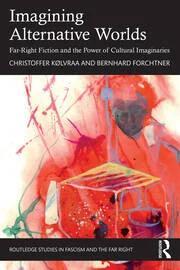216 pages
Langue : English
Publié 10 novembre 2024 par Routledge.
Far-Right Fiction and the Power of Cultural Imaginaries

216 pages
Langue : English
Publié 10 novembre 2024 par Routledge.
Imagining Alternative Worlds explores how the far right employs fictionality as a powerful political tool in the 21st century. It does so by examining the far-right's own cultural commentary through a large collection of its novels, novellas, short stories, and film reviews, illustrating how the 'alternative worlds' articulated in such cultural products convey its ideology. More specifically, the book identifies and analyses four distinct far-right 'cultural imaginaries' - a 'primordial', a 'nostalgic', a 'promethean' and a 'nihilist' one - that each subtly convey different yet linked ideas about space, time, 'race', love and heroic identity. By thereby drawing attention to the 'cultural heterogeneity' of the contemporary far right, Imagining Alternative Worlds offers key insights into the dreams, identities and norms such actors hope will define our future. The book will be of interest to researchers of the far right, of literary, media and communication studies, and of social and cultural …
Imagining Alternative Worlds explores how the far right employs fictionality as a powerful political tool in the 21st century. It does so by examining the far-right's own cultural commentary through a large collection of its novels, novellas, short stories, and film reviews, illustrating how the 'alternative worlds' articulated in such cultural products convey its ideology. More specifically, the book identifies and analyses four distinct far-right 'cultural imaginaries' - a 'primordial', a 'nostalgic', a 'promethean' and a 'nihilist' one - that each subtly convey different yet linked ideas about space, time, 'race', love and heroic identity. By thereby drawing attention to the 'cultural heterogeneity' of the contemporary far right, Imagining Alternative Worlds offers key insights into the dreams, identities and norms such actors hope will define our future. The book will be of interest to researchers of the far right, of literary, media and communication studies, and of social and cultural history